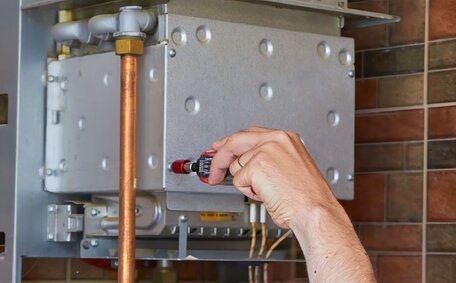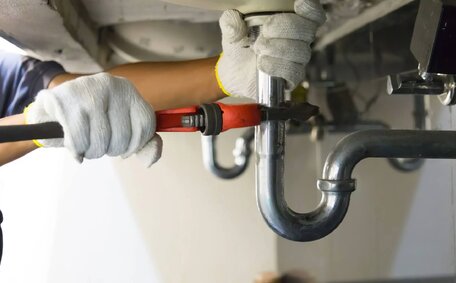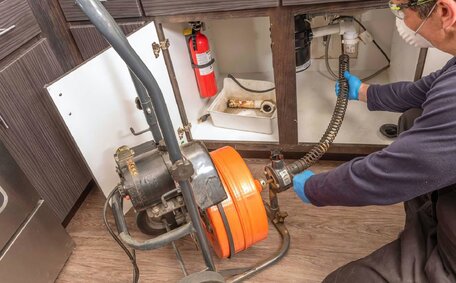What is a tankless water heater and how is it different from traditional water heaters?
Tankless hot water systems, known for their efficiency, heat water directly without the use of a storage tank. This contrasts with traditional systems which use an insulated tank to store hot water, providing a fixed amount based on tank water capacity.
The tankless hot water systems work by rapidly engaging to heat water, optimising the way water flows through the heat exchanger the moment you turn the hot water tap on.
The main differences are that tankless heaters are far more compact, taking up less space. The main differences are that tankless heaters are far more compact, taking up less space.
They can also churn out water heated continuously akin to an instant hot water system, never depleting even if the demand peaks. They also tend to have lifespans longer than 20 years versus gas hot water tank heaters lasting 10-15 years on average.
On the downside, unlike the tankless models, traditional storage hot water systems typically carry higher energy usage over time, not demonstrating how efficiently a tankless water heater works. They may also not align with the specific hot water demand of your home if it has low flow plumbing fixtures. Understanding how do tankless water heaters work is essential: multiple water outlets running simultaneously can cause a temperature drop when hot water demand exceeds flow rate limitations.
Main components and operating principles of tankless water heaters
When comes to the main components, a tankless water heater includes:
- Heat exchanger - In electric tankless water heaters, this component heats water as water flows through and gets rapidly heated. It’s made of durable copper or stainless steel.
- Natural gas water systems’ heaters or heating elements - These are fuelled by gas burners, propane, or electricity to generate the necessary heat.
- Flow sensor - Integral to flow hot water systems, detecting when hot water tap turned is opened to initiate and turn hot water heating.
- Control board - Manages the system’s functions and controls the heating rate.
When a hot water tap is turned on, gas tankless water heaters engage as the flow sensor detects the water demand and sends a signal to the control board to meet the water need by igniting the burner or activating the heating elements, demonstrating how efficiently the water heater works. The board also determines the optimal heating rate to heat water and turn it hot based on the incoming water temperature and desired output temperature.
Cold inlet water enters and initiates the water supply, warming as it moves through the sealed heat exchanger. The hot water heater can ensure the water heated maintains a continuous flow to supply hot water to the tap until turned off.
As it flows through, gas water heating is achieved as the burner or heating elements swiftly raise the water to the desired set point with a temperature rise of up to 70°F from inlet to outlet.
The tankless system is adept at handling multiple water draws at the same time with varying flow rates to maintain a consistent hot water supply, though low-volume fixtures can occasionally impact water temperature.
Heat exchanger technology
Understanding how water heaters work, particularly tankless models, begins with the heat exchanger, the core of the heater itself where the water flows through unit. This component enables the rapid on-demand heating of water as it flows through the sealed unit. It is designed to efficiently transfer heat from the burner or heating elements to the incoming cold water.
The tankless heater’s heat exchanger is made of highly conductive copper or stainless steel in a compact, corrugated pattern. This design choice ensures heaters can facilitate maximum heat transfer and temperature rise within seconds, while withstanding high water pressure.
They often incorporate sophisticated controls that meticulously adjust the heating, measured in gallons per minute, to sync with the flow rate and temperature, ensuring consistent hot water delivery.
As there is no tank and water sits idle, tankless heat exchangers are highly energy efficient, wasting very little energy. If you’re exploring the requirements for higher efficiency, you’ll need to grasp how tankless water heater mechanisms can save your water and energy costs up to 50% annually compared to traditional tank storage water heating methods.
To maintain efficiency, annual inspection and descaling (removal of mineral deposits) of the heat exchanger may be required in areas with hard water. A clean, deposit-free exchanger optimises hot water capacity, flow rate, and performance.
Benefits and advantages of tankless water heaters
Gas hot water heaters can offer several notable benefits, with tankless models surpassing conventional storage tank versions:
- Continuous flow hot water - Tankless heaters ensure a steady delivery of hot water, which can prevent the risk of running out hot water.
- Space savings - Their compact size offers more room, ideal for instant hot water solutions in tight spaces.
- Energy efficiency - Greater savings than storage system energy losses, which can save up to 34% on energy bills.
- Longevity - An average lifespan of 20 years as compared to 10-15 years for a traditional tank heater.
Being capable of delivering a significant amount hot water can be a boon for larger households with high demand. The superior energy efficiency also translates into lower annual costs for the whole house.
However, considering how much the cost upfront is, a tankless system can seem like a substantial investment, unlike more upfront cost-friendly storage tank water heaters. Homeowners could consider more affordable financing options as the long-term savings can cost up to offset the initial investment over time.
Considerations when deciding whether to install tankless
There are several key factors to weigh up when deciding whether to install a tankless water heating system:
- Higher upfront costs – Electric tankless heaters do tankless indeed tend to cost more to purchase and install than conventional units.
- Increased maintenance needs – Due to mineral buildup issues in hard water areas, annual descaling is essential to maintain efficiency and performance.
- Flow rate limitations – Running multiple taps or showers simultaneously may lead to a slight drop in water temperature depending on the heater capacity.
- Higher energy bills if improperly sized – An undersized tankless unit with insufficient heating capacity for the household’s typical demand would be ineffective and waste energy.
To grasp how a tankless water heater can fit into your home, consider your peak hot water requirements and select a unit that aligns with your needs. While more expensive initially, the long-term savings from higher efficiency and longevity can make them a sound investment in the right situation.
Professional installation recommendations and requirements
We strongly advise getting a professional plumbing contractor like Dulwich Hill Plumbing to install your tankless water heater. Improper installation can lead to inefficiency, performance issues, and even safety hazards if local codes are not followed.
Due to the complexity of water tankless systems, managing your heating solution is not a DIY project for the average homeowner. Our qualified, licenced plumbers understand the intricacies of how do tankless water heaters work and have extensive experience with their installations. We ensure correct sizing based on your expected demand, adhere to regulations, and fine-tune the system for optimal efficiency.
Key aspects we handle include gas line testing and upgrades if needed, venting, condensate drainage, electrical wiring, water filtration pre-treatment, system flushing, and integration with your existing plumbing. We also offer customised ongoing maintenance plans to keep your system working flawlessly for years.
Rely on our expertise in how does a water heater work to get your new system properly set up. When correctly sized and installed, you’ll enjoy endless hot water along with the energy savings and convenience these systems offer.
Maintenance tips for tankless water heaters
Performing regular maintenance on your tankless water heater will extend its lifespan and prevent issues from arising. Here are some key maintenance tips:
- Inspect and flush the heat exchanger annually to remove sediment buildup. Descaling is also advised yearly in hard water areas to prevent mineral deposits.
- Check and replace the water filter if fitted. A clean filter allows proper water flow.
- Have a professional inspect the burner and igniter for any corrosion or damage. Ensure gas connections are tight.
- Check that condensate drains are clear and flowing freely without blockages.
- Inspect the overall system, pipework, and venting for leaks, damage, or blockages.
- Test water flow and temperature at all outlets to check for restrictions impacting performance.
Following this routine maintenance schedule will optimise efficiency and performance. Keep your tankless water heater running in peak condition for endless hot water on demand.
Troubleshooting common tankless water heater issues
Tankless water heaters are generally reliable, but occasional issues can arise. Here are some common problems and troubleshooting tips:
Temperature fluctuations
If the hot water temperature fluctuates, this is likely due to:
- Low water flow rates - Install higher flow rate fixtures
- Heater undersized - The heating capacity cannot handle demand
- Scale buildup in heat exchanger - Have the unit descaled
Error codes on display
Error codes indicate a specific fault has occurred. Note the code and contact a professional like Dulwich Hill Plumbing to diagnose and repair.
No hot water at outlets
If there is no hot water delivery, check:
- The power supply and gas supply valve position
- Filters for blockages
- Condensate drains for obstructions
Should these steps not fix the issue, reach out to us, and our system can provide expert assistance.
For any persisting tankless water heater problems, contact Dulwich Hill Plumbing on 1300 349 338 or [email protected]. Our qualified technicians can accurately diagnose issues and get your system running properly again.






